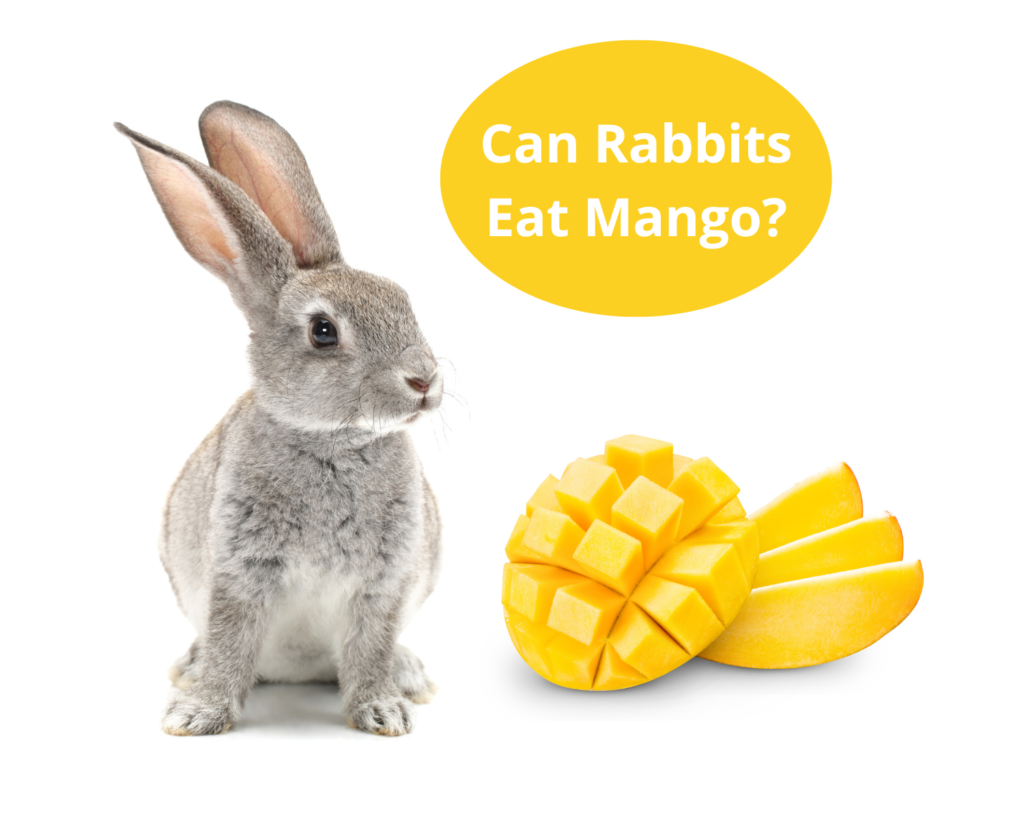Fruit is a great treat for a rabbit, adding diversity, vitamins, and minerals to its diet in a simple and healthy way. But not all fruits are made equal!
Can rabbits eat mango? Read on to find out!
Can Rabbits Eat Mango?
Rabbits can eat mango safely. However, this fruit must only be given in small amounts and as a rare treat. This is because a rabbit’s diet is supposed to consist primarily of hay, secondarily of pellets, and thirdly of vegetables before fruit.
Nutritional Information Of Mango
One serving of mango for a rabbit will differ depending on a rabbit’s size, age, and the other fruits you plan to serve it.
For the sake of ease, this is the nutritional information of 100g of mango from the US Department of Agriculture’s FoodData Central.
- Energy: 60 kcal
- Water: 83.5 g
- Carbohydrates: 15 g
- Sugar: 13.7 g
- Dietary fiber: 1.6 g
- Protein: 0.82 g
- Fats: 0.38 g
- Potassium: 168 mg
- Vitamin C: 36.4 mg
- Phosphorus: 14 mg
- Calcium: 11 mg
- Magnesium: 10mg
- Choline: 7.6 mg
- Sodium: 1 mg
- Iron: 0.16 mg
- Beta carotene: 640 µg
- Vitamin A: 54 µg
- Folate: 43 µg
- Lutein + zeaxanthin: 23 µg
- Vitamin K: 4.2 µg
100g is approximately one-third of a mango, and you are unlikely to feed this much to a rabbit, so consider that moving forward!
Potential Hazards To Watch For When Feeding Mango
1. Gastrointestinal Upset
Mangos are highly acidic and have a ton of fiber in them, so a lot of mango at once can cause a lot of gastrointestinal problems.
This includes nausea, diarrhea, vomiting, status, and loss of appetite.
2. Sugar Content
Mangos are extremely high in sugar. Too much can risk dental issues for your rabbit or lend itself to obesity and diabetes.
3. Addiction
Rabbits can develop an addiction to any kind of fruit because of their sweet nature. If a rabbit gets used to a lot of fruit in its diet, it can refuse to eat healthier options or its usual hay and pellets.
Benefits To Feeding Your Rabbit Mango
1. Vitamin and Antioxidant Content
There are a lot of different vitamins in mango, especially vitamins A and C.
These vitamins are crucial for a rabbit’s immune system, promote health and healing, and can even prolong a rabbit’s lifespan. Antioxidants do the same, fighting oxidative damage to cells and repairing tissue.
2. Fiber Content
Mango and mango peels have loads of fiber. In moderation, fiber can improve gut health, reduce bloating, and help overall digestion for rabbits.
3. Calcium and Other Mineral Content
There’s a decent amount of calcium in mangos, which is beneficial for bone and tooth health.
Mangos also have a lot of other minerals in them that promote things like tissue repair, organ function, and general health.
Best Ways To Feed Mango
The best way to feed your rabbit mango is by cutting it into small pieces and serving it as a treat. You can place the small cubes inside puzzle toys or simply give them on a plate to munch.
You must always wash mangos before cutting them up, whether for your consumption or for your rabbit’s consumption.
You don’t have to peel a mango to give it to your rabbit, as the peels contain a lot of fiber and are beneficial for rabbits, who can enjoy chewing on the texture.
Just make sure that you completely rinse the peel first to prevent bacteria or chemicals from being consumed by your rabbit.
You may also juice a mango (without adding any sugar or other additives) and serve plain, pure mango juice as a mix-up with other foods or directly in a small container. It’s a great refreshing treat for a rabbit!
Frozen mango (again, pure without any additives) is another option that you can use, especially on hot summer days. It’s a good idea to let frozen mangos thaw a little bit before giving them to your rabbit to prevent overly hard fruit or other complications.
You should not feed your rabbits mango seeds. While there is nothing inherently toxic about them, the seeds can damage your rabbit’s teeth.
You should also never feed your rabbits dried mango, as dried fruit contains extremely high sugar levels that can lead to diabetes and obesity.
How Much Mango Can A Rabbit Safely Have?
A rabbit’s diet is meant to consist primarily of hay, then pellets, then vegetables, and only then should fruit be a part of the picture. This means mango can only be given in small amounts as a special treat.
Rabbits should consume only one teaspoon of mango per their 2 lbs of body weight, and only once per day, once or twice per week at most.
This amount should drop further if you’re feeding your rabbit other fruit. Juvenile rabbits below the age of one should not have any mango or other fruit at all.
When you first introduce mango to your rabbit’s diet, start with just a small amount and monitor their reaction and stools.
If your rabbit seems fine and happy with the mango, you can gradually increase how much mango you provide over time.
Conclusion
Rabbits can eat mango as a treat, with a limit of about one teaspoon just once or twice a week, depending on how large they are. Mango can be served with the skin on, preferably cut into small cubes, or offered as pure juice with no additives.
Though only a little can be provided at any one time, the small amount can be a wonderful way to treat your bunny!

